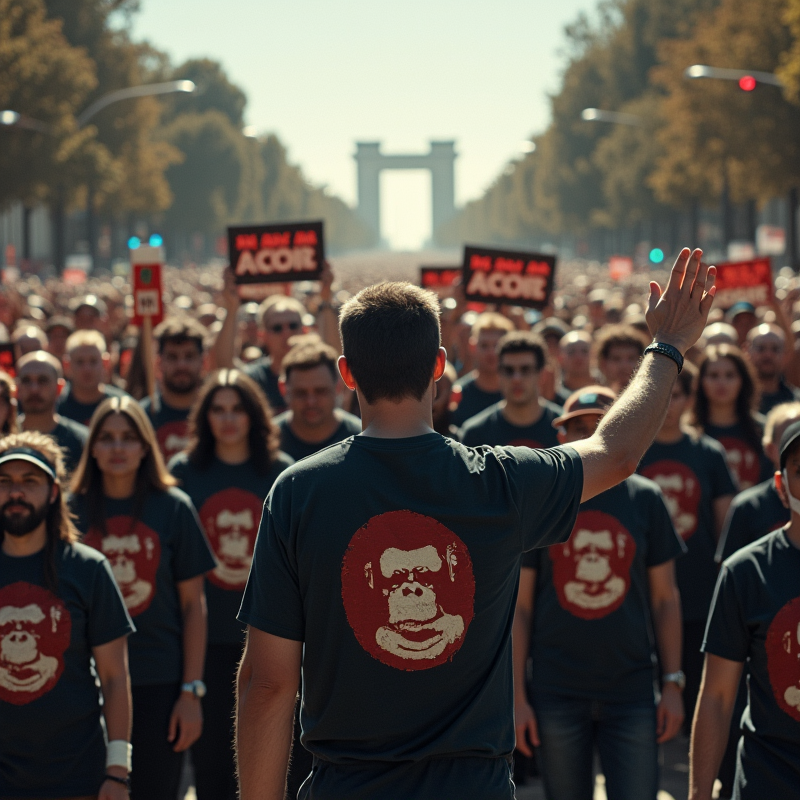“Flying Monkeys” and Manipulation in Capitalist Democracy
The rise of hired crowd firms like Crowds on Demand has sparked controversy and ethical debates about their impact on democracy, civil society, and advocacy. While these companies claim to provide actors for promotional events or business launches, critics argue that they can also be used as tools for manipulation, harassment, and abuse—a phenomenon known as “flying monkeys.”
What are “Flying Monkeys”?
“Flying monkeys” is a term derived from popular psychology that refers to individuals who act as agents of a manipulator, carrying out harmful actions like spreading rumors, engaging in character attacks, or participating in smear campaigns against a target^1_1. In the context of hired crowd firms, these actors become extensions of their clients’ agendas, potentially inflicting emotional, reputational, or psychological harm on victims.
Common Use-Cases for “Flying Monkeys” in Hired Crowds
- Harassment Campaigns: Some clients may hire crowds to intimidate or bully a target, amplifying pressure in legal, political, or business disputes^1_4.
- Political Manipulation: Actors can pose as supporters or protesters to shape public opinion fraudulently and isolate legitimate voices[^1_11].
- Corporate/ Personal Attacks: Creating fake support, testimonials, or pressure groups to manipulate outcomes^1_3.
The Relationship Between Capitalism and Democracy
The relationship between capitalism and democracy is complex, with inherent tensions between market forces and democratic values^2_1. Hired crowd firms like Crowds on Demand highlight these contradictions—they offer a service that can be used to manipulate public opinion, influence political outcomes, or suppress minority voices, all while operating within the bounds of capitalist logic.
In capitalist societies, money and resources are often concentrated in the hands of wealthy elites who have the means to shape public discourse and political processes. Hired crowd firms provide one mechanism for these elites to exert influence—by purchasing crowds to demonstrate support or opposition for particular causes, they can manipulate public perception and skew democratic outcomes.
Potential Consequences and Risks
Using paid crowds for advocacy raises several potential consequences:
- Erosion of Public Trust: The use of hired crowds at political events or protests can erode public trust in political processes, media reports, and social movements by creating an appearance of authenticity that may not be genuine^2_3.
- Manipulation of Political Outcomes: By influencing the perceived popularity or legitimacy of certain candidates, policies, or causes, paid crowds can manipulate election outcomes and policy decisions^2_4.
- Undermining Genuine Advocacy: Hired crowds can overshadow or drown out authentic voices in advocacy campaigns, potentially silencing genuine grassroots movements and marginalizing minority opinions^2_5.
- Concentration of Power: The use of paid crowds can contribute to a further concentration of power in the hands of economic elites at the expense of democratic principles like equality and transparency^2_6.
Addressing the Risks
To mitigate the risks associated with hired crowd firms:
- Regulation: Governments could implement regulations requiring disclosure when paid actors are involved in political advocacy or protests. This would help ensure transparency and allow voters to make informed decisions about the authenticity of public demonstrations^2_7.
- Ethical Guidelines: Hired crowd firms should adopt clear ethical guidelines and refuse jobs involving illegal activity, harassment, or hate groups. They could also implement a code of conduct for their actors to prevent abuse^1_4.
- Public Awareness: Journalists and citizens need to be vigilant about the potential use of hired crowds at events or demonstrations, questioning their authenticity and impact on democratic processes. Media outlets should investigate and report on instances of manipulation by paid crowds^2_8.
Conclusion
The rise of hired crowd firms highlights the tensions between capitalism and democracy—how market forces can be used to manipulate public opinion, influence political outcomes, or suppress minority voices in capitalist societies.
While not all hired crowd actors are “flying monkeys,” their potential for abuse raises serious ethical concerns about the integrity of democratic processes. To safeguard genuine grassroots engagement and protect democracy, it is essential to implement regulations, promote transparency, and foster public awareness about the risks posed by these firms.
Only then can societies work towards a more equitable distribution of power and a more authentic democracy—a system where the voices of ordinary citizens are not drowned out by those with deep pockets willing to purchase crowds for their own gain[^2_10].
Revealing all these unnatural things happening in the capitalist “democracy”, we can observe that no regulation could change things in better. The solution is to replace the system. And I don’t think that no-brain flying monkeys would do that…


